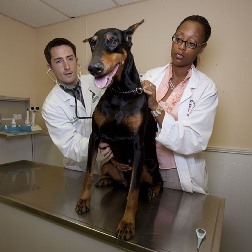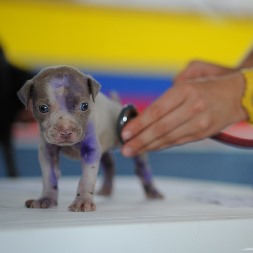How to Select a Veterinary Assistant Training near Plummer Idaho
 Realizing your lifelong aspiration of working with and caring for animals by enrolling in a veterinary school near Plummer ID could initially seem like an overwhelming undertaking. After all, you must find and enroll in a program that will furnish the appropriate training to ensure that you can succeed as a veterinary assistant, technician or technologist. But just how do you go about reviewing and comparing colleges so that you can make the ideal choice? Many potential students launch their due diligence process by looking for colleges that are near their residences. After they have identified some nearby schools, they determine which ones have the cheapest tuition and hone in on those. Although cost and location are important concerns when evaluating vet tech schools, they are by no means the only important ones when making your evaluations. Qualifications such as internship programs and accreditation need to be looked into as well. The point is that there are questions you need to be asking the veterinary tech programs you are considering before you make a final choice. We have provided several in this article to help get you started, but before we review them we’ll explore the various responsibilities of vet techs and assistants and the training options offered.
Realizing your lifelong aspiration of working with and caring for animals by enrolling in a veterinary school near Plummer ID could initially seem like an overwhelming undertaking. After all, you must find and enroll in a program that will furnish the appropriate training to ensure that you can succeed as a veterinary assistant, technician or technologist. But just how do you go about reviewing and comparing colleges so that you can make the ideal choice? Many potential students launch their due diligence process by looking for colleges that are near their residences. After they have identified some nearby schools, they determine which ones have the cheapest tuition and hone in on those. Although cost and location are important concerns when evaluating vet tech schools, they are by no means the only important ones when making your evaluations. Qualifications such as internship programs and accreditation need to be looked into as well. The point is that there are questions you need to be asking the veterinary tech programs you are considering before you make a final choice. We have provided several in this article to help get you started, but before we review them we’ll explore the various responsibilities of vet techs and assistants and the training options offered.
The Role of a Vet Tech and Assistant
 One of the initial decisions that you will have to make is if you plan to train as a vet assistant, technician or technologist. Part of your decision may be predicated on the amount of time and money that you have to commit to your education, but the main determiner will probably be which specialization appeals to you the most. What vet techs and assistants have in common is that they both work under the direct direction of a practicing and licensed veterinarian. And while there are a number of duties that they can perform within the Plummer ID veterinary clinic or hospital, they can’t prescribe medications, diagnose health issues, or perform surgical procedures. In those areas they can only provide assistance to a licensed veterinarian. There are technicians and technologists that work outside of the conventional vet practice, for example for zoos, animal shelters or police departments. Let’s take a look at the responsibilities and training prerequisites for each specialty.
One of the initial decisions that you will have to make is if you plan to train as a vet assistant, technician or technologist. Part of your decision may be predicated on the amount of time and money that you have to commit to your education, but the main determiner will probably be which specialization appeals to you the most. What vet techs and assistants have in common is that they both work under the direct direction of a practicing and licensed veterinarian. And while there are a number of duties that they can perform within the Plummer ID veterinary clinic or hospital, they can’t prescribe medications, diagnose health issues, or perform surgical procedures. In those areas they can only provide assistance to a licensed veterinarian. There are technicians and technologists that work outside of the conventional vet practice, for example for zoos, animal shelters or police departments. Let’s take a look at the responsibilities and training prerequisites for each specialty.
- Vet Assistants in almost all cases will have undergone a formal training program, either as an apprentice or intern in a vet clinic or hospital, or by finishing a certificate program at a trade school or community college near Plummer ID. As the name implies, their job function is to assist the vets and vet technicians in the execution of their duties. Normally they are not associated with more involved undertakings, for instance assisting with surgeries. Some of their regular responsibilities may include working at the front desk, preparing and cleaning exam rooms and equipment, or handling animals during exams.
- Vet Technicians receive more extensive training compared with assistants and typically obtain a two year Associate Degree, ideally from an American Veterinary Medical Association (AVMA) accredited program. They are in a sense the veterinarian equivalent of medical nurses, since their general job function is to assist vets with diagnosing and treating animal patients. Where they stand apart from vet assistants is that they are included in more involved functions, for instance assisting with surgical procedures or administering medicine. All states presently mandate that veterinary technicians pass a credentialing examination for either registration, certification or licensing.
- Vet Technologists are similar to vet technicians and essentially perform the same work functions. They are mandated to obtain a Bachelor’s Degree in veterinary technology, which typically takes four years to complete. So the main difference between a vet technician and a technologist is the technologist’s higher level of education. But with an advanced degree comes more work opportunities, increased salaries and possible management positions. They are also mandated to pass a credentialing examination for either registration, certification or licensing.
Veterinary technicians and technologists can specialize in areas such as internal medicine, anesthesia or emergency care. A number may receive certification from the American Association for Laboratory Animal Science (AALAS) to work in laboratories or Plummer ID area research facilities as well.
Vet Online Degree Programs
 An option that may be a solution for those with a hectic lifestyle or who are working full-time while going to vet school is to enroll in an online training program. Because the classes are provided through the internet, students can study on their own timetable wherever a computer is accessible. The syllabus is taught using multiple methods, including slide shows, videos and live streaming webinars. And since many vet technician and technologist degrees require practical training, that portion can usually be fulfilled as an internship or work study program at an area Plummer ID veterinary clinic or hospital. Distance learning, as it is also called, can in many instances reduce the cost of your education. Tuition and supplementary expenditures, such as for commuting and study supplies, may be cheaper compared to more traditional classroom programs. Just confirm that the program that you choose is accredited, either by the AVMA or another nationally certified accrediting organization. With the online courses and the clinical training, everything is furnished for a complete education. So if you are dedicated enough to learn in this more independent manner, an online veterinary technician or assistant program may be the ideal choice for you.
An option that may be a solution for those with a hectic lifestyle or who are working full-time while going to vet school is to enroll in an online training program. Because the classes are provided through the internet, students can study on their own timetable wherever a computer is accessible. The syllabus is taught using multiple methods, including slide shows, videos and live streaming webinars. And since many vet technician and technologist degrees require practical training, that portion can usually be fulfilled as an internship or work study program at an area Plummer ID veterinary clinic or hospital. Distance learning, as it is also called, can in many instances reduce the cost of your education. Tuition and supplementary expenditures, such as for commuting and study supplies, may be cheaper compared to more traditional classroom programs. Just confirm that the program that you choose is accredited, either by the AVMA or another nationally certified accrediting organization. With the online courses and the clinical training, everything is furnished for a complete education. So if you are dedicated enough to learn in this more independent manner, an online veterinary technician or assistant program may be the ideal choice for you.
What to Ask Veterinary Assistant and Technician Colleges
 At this point you should have decided on which veterinary certificate or degree that you want to obtain, and if you intend to study online or attend a program on campus. Since there are an abundance of veterinarian community colleges, vocational and trade schools in Idaho as well as across the Country, you need to ask some qualifying questions in order to narrow down your list of alternatives. As we mentioned in our opening, many future students start by focusing on location and tuition expense. But we have previously pointed out other essential qualifiers, such as accreditation and internship programs. And obviously you want to choose a college that offers the degree and specialty that you are interested in. These and other factors are addressed in the list of questions that you need to ask the Plummer ID veterinary assistant and tech programs that you are looking at.
At this point you should have decided on which veterinary certificate or degree that you want to obtain, and if you intend to study online or attend a program on campus. Since there are an abundance of veterinarian community colleges, vocational and trade schools in Idaho as well as across the Country, you need to ask some qualifying questions in order to narrow down your list of alternatives. As we mentioned in our opening, many future students start by focusing on location and tuition expense. But we have previously pointed out other essential qualifiers, such as accreditation and internship programs. And obviously you want to choose a college that offers the degree and specialty that you are interested in. These and other factors are addressed in the list of questions that you need to ask the Plummer ID veterinary assistant and tech programs that you are looking at.
Is the Veterinary School Accredited? It’s essential that you verify that the vet tech or assistant college you select is accredited by a regional or national accrediting organization. As previously discussed, among the most highly regarded is the American Veterinary Medical Association (AVMA). Trade schools and colleges that are accredited by the AVMA have undergone a thorough screening process that confirms you will get a superior education. Also, accreditation is necessary if you are applying for a student loan or financial assistance, since a large number of programs are not offered for non-accredited colleges. And finally, having a certificate or degree from an accredited college is frequently a precondition for employment for many Plummer ID veterinarian practices and hospitals.
What is the College’s Reputation? The veterinarian vocational school or college and program you enroll in should have an excellent reputation within the veterinary field. You can initiate your due diligence by asking the schools you are looking at for references from the employers in their job placement network. Other suggestions include checking with online school ranking websites and contacting the school’s accrediting agencies as well. You can ask the Idaho school licensing authority if there have been any complaints or violations relating to your specific schools. As a final suggestion, contact some Plummer ID veterinary clinics that you may wish to work for after you receive your training. Ask what they think of your school choices. They might even recommend one or more colleges not on your list.
Are there Internship Programs? The most effective means to get clinical hands on training as a vet assistant or technician is to work in a medical setting. Find out if the schools you are looking at have internship programs established with local veterinarians, vet clinics or hospitals. Almost all veterinary medicine programs mandate clinical training and many provide it through internships. Not only will the experience be valuable relative to the practical training, but an internship may also help establish associations in the local Plummer ID veterinarian community and help in the search for a position after graduation.
Is Job Placement Provided? Finding a job after graduating from a veterinary tech or assistant school can be challenging without the assistance of a job placement program. To begin with, ask what the graduation rates are for the colleges you are considering. A lower rate might signify that the teachers were unqualified to teach the syllabus or that a number of students were unhappy with the program and quit. Next, check that the colleges have a job assistance program and find out what their placement rates are. A high placement rate might mean that the Plummer ID college has an exceptional reputation within the veterinary community and has a considerable network of contacts for student placements. A lower rate might indicate that the training is not highly regarded by employers or that the job placement program is ineffective at placing students.
How Big are the Classes? If the classes are bigger, you probably will get little or no personalized instruction from the teachers. Find out from the Plummer ID programs you are looking at what their classroom student to teacher ratios are. You might also decide to sit in on a few classes (if practical) to observe the interaction between students and teachers. Ask for evaluations from students concerning the quality of instruction. Also, speak with the teachers and find out what their qualifications are as well as their approaches to teaching.
Where is the College Located? Of course, we previously covered location, but there are a few more points to make on the subject. If you are going to commute to your vet assistant classes from work or home, you have to make sure that the commuting time fits into your schedule. For example, driving during the weekend to check out the route won’t be the same as the commute during rush hour traffic, particularly if the Plummer ID college is located close by or within a large city. Also, if you do choose to enroll in a college in another state or even outside of your County of residence, there may be higher tuition charges particularly for community and state colleges. Of course taking classes online may be an option that will provide you with more flexibility and reduce the need for travel.
Is the Class Schedule Flexible? And last, it’s essential that you determine if the Idaho veterinarian colleges you are looking at offer class times flexible enough to fit your schedule. For instance, a number of students continue to work full time and can only attend classes on the weekends or at night. Some might only be able to go to classes in the morning or in the afternoon. Make certain that the class times you need are available near Plummer ID before enrolling. Also, find out if you can make-up classes that you may miss because of sickness, work or family responsibilities. You may find that an online program is the best way to fit your vet training into your hectic life.
Why Did You Desire to Become a Vet Tech?
When preparing to interview for a veterinary job, it's important to review questions you could be asked. Among the things that interviewers often ask veterinary prospects is "What drove you to pick veterinary care as a career?". What the interviewer is trying to uncover is not merely the private reasons you might have for becoming a vet tech, but additionally what characteristics and skills you have that make you outstanding at your profession. You will likely be asked questions relating specifically to veterinary care, as well as a significant number of typical interview questions, so you need to organize several strategies about how you would like to respond to them. Since there are several variables that go into choosing a career, you can address this fundamental question in a variety of ways. When readying an answer, attempt to include the reasons the work appeals to you in addition to the talents you have that make you an excellent vet tech and the perfiect choice for the job. Don't make an effort to memorize an answer, but jot down several ideas and anecdotes that relate to your own experiences and strengths. Reviewing sample answers can help you to prepare your own concepts, and provide ideas of what to discuss to enthuse the recruiter.Choose the Ideal Vet Assistant Training Program near Plummer ID
Enrolling in the appropriate vet assistant or tech school is an important first step to starting a fulfilling career providing care and treatment for animals. Students looking into vet assistant or tech programs must make their selection based on several key factors. Vet techs, assistants and technologists work in animal hospitals, veterinary clinics and animal shelters. They usually handle administrative responsibilities and support the veterinarian with the animal patients when needed. As we have discussed, it’s very important that you decide on a veterinary medicine program that is both accredited and has an excellent reputation within the field. This goes for vet tech online schools as well. By asking the questions provided in our checklist for reviewing schools, you will be able to narrow down your options so that you can make your final selection. And by selecting the ideal program, you can reach your goal of becoming a veterinary assistant, technician or technologist in Plummer ID.
A Little Bit About Plummer ID
Plummer, Idaho
Plummer is a city in Benewah County, Idaho, United States. The population was 1,044 at the 2010 census, up from 990 in 2000.[5] It is the largest city within the Coeur d'Alene Reservation, and is accessed by U.S. Route 95, the state's primary north-south highway.
As of the census[2] of 2010, there were 1,044 people, 374 households, and 261 families residing in the city. The population density was 835.2 inhabitants per square mile (322.5/km2). There were 405 housing units at an average density of 324.0 per square mile (125.1/km2). The racial makeup of the city was 45.7% White, 1.1% African American, 42.7% Native American, 0.1% Pacific Islander, 0.7% from other races, and 9.8% from two or more races. Hispanic or Latino of any race were 8.0% of the population.
There were 374 households of which 43.3% had children under the age of 18 living with them, 41.7% were married couples living together, 15.2% had a female householder with no husband present, 12.8% had a male householder with no wife present, and 30.2% were non-families. 25.4% of all households were made up of individuals and 10.9% had someone living alone who was 65 years of age or older. The average household size was 2.78 and the average family size was 3.27.
More Cities of Interest in Idaho
